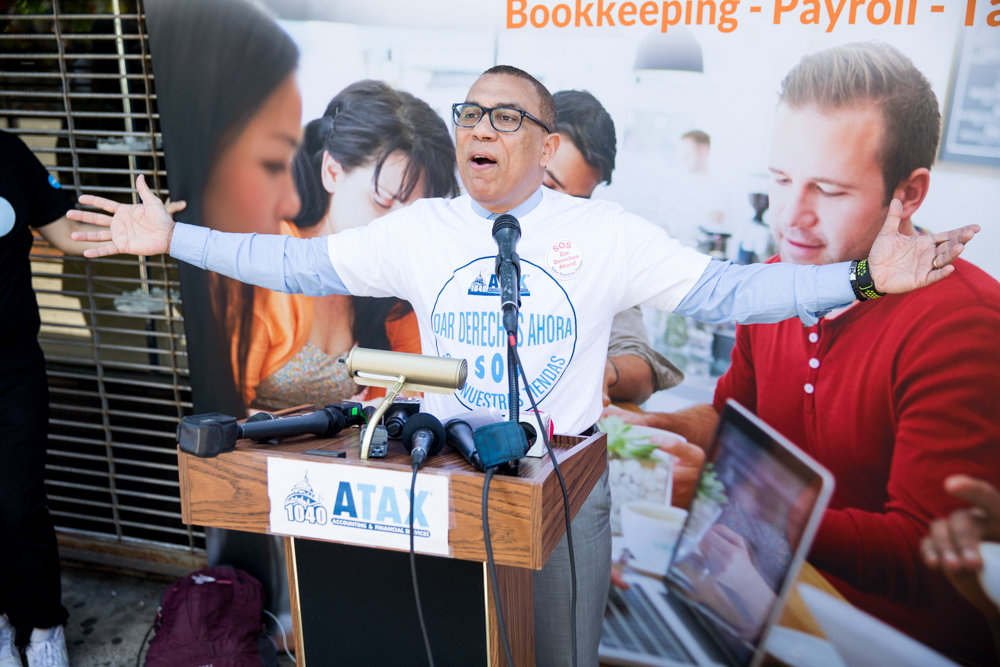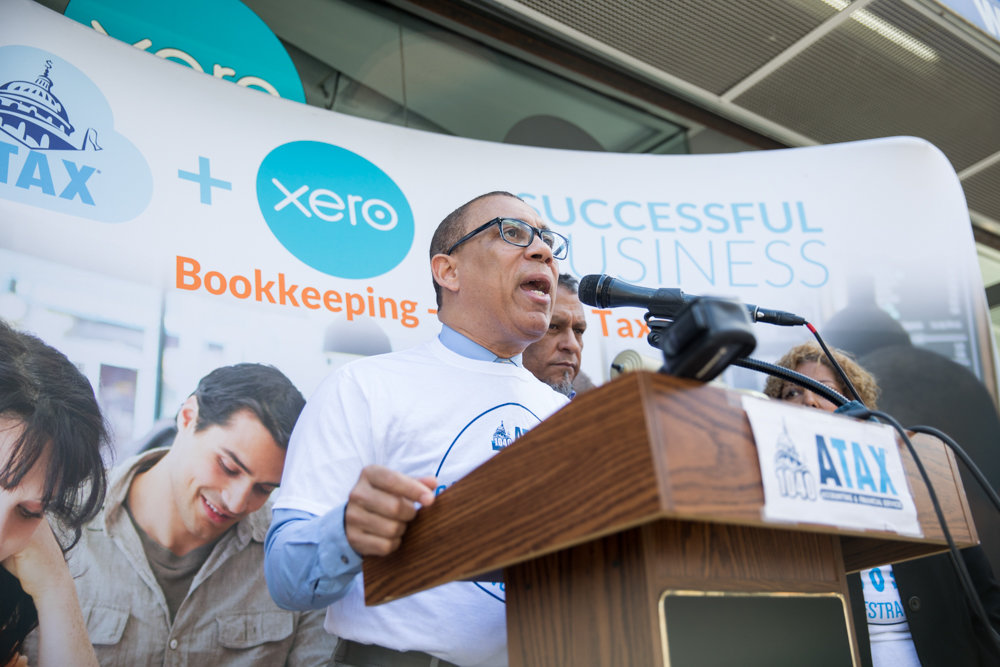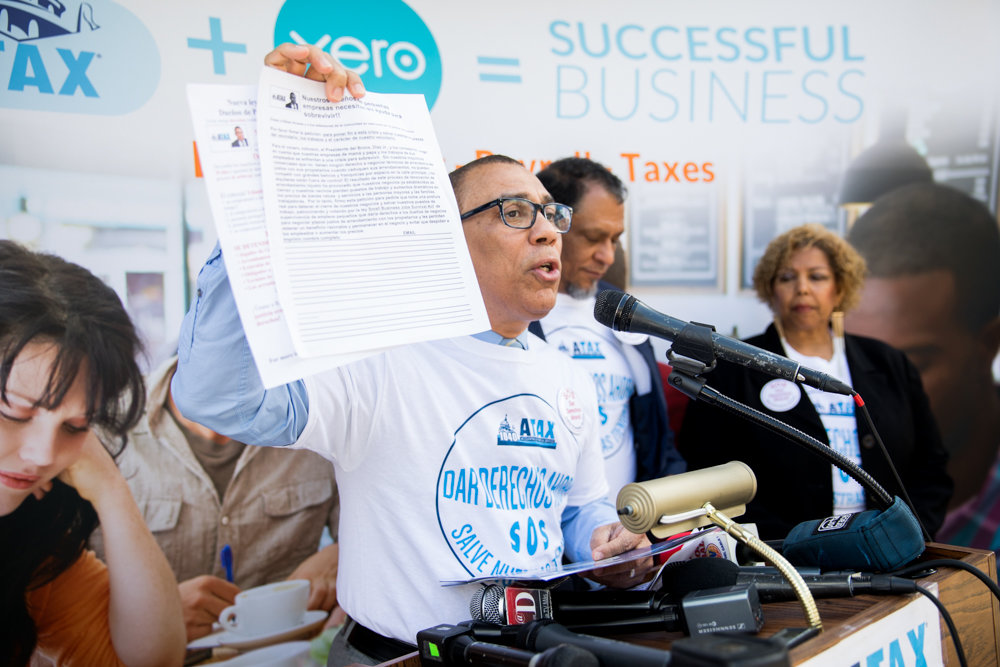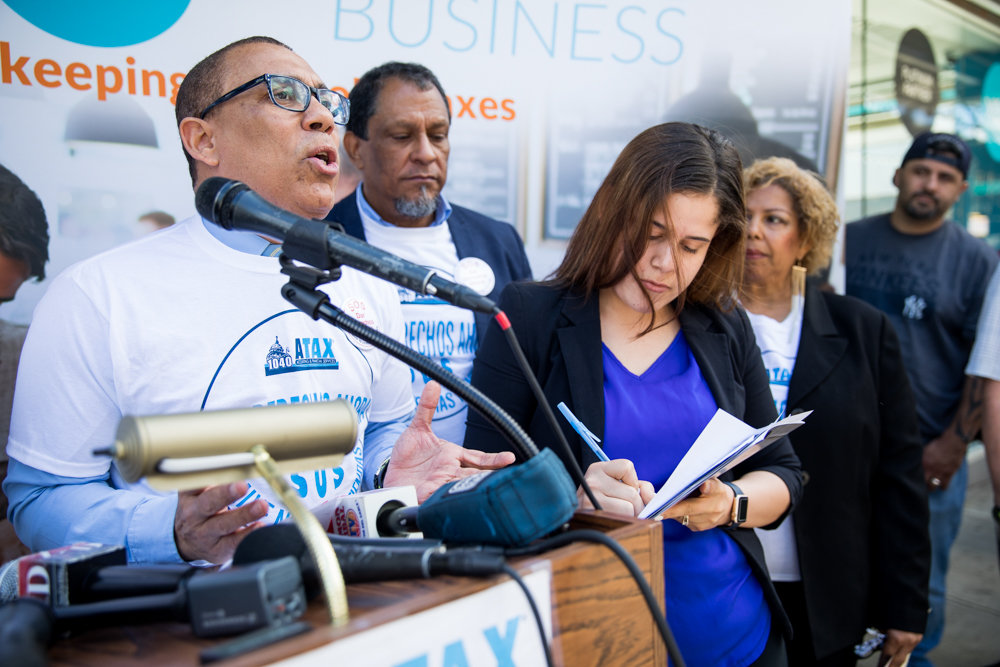Immigrant entrepreneurs demand lease protection
Each time the 1 train passed overhead, Rafael Alvarez paused his speech out of fear the rumble of the El would drown out his voice. For Alvarez, his message of support for a commercial tenants rights bill needed to be heard.
Despite the periodic disruptions at the May 24 rally, Alvarez — owner of the Atax tax preparation and business services location in Kingsbridge — made clear his support for the proposed Small Business Jobs Survival Act. And in case the trains above were indeed too loud, his message was emblazoned in Spanish on his T-shirt: “Dar derechos ahora,” read one line — “give rights now.” Another sentence was “Salve nuestras tiendas” — “save our stores.”
Alvarez leads a campaign of immigrant business owners pushing the city council to pass the jobs survival act, which proponents claim will protect commercial tenants when negotiating leases with landlords. Speaking outside of his 5536 Broadway location, Alvarez launched the Save Our Stores campaign with the goal of collecting signatures from 10,000 customers who patronize some 3,000 mostly immigrant and Hispanic small business owners in the Bronx and northern Manhattan.
“A growing crisis is destroying the backbone of our local economy,” Alvarez said in Spanish, according to translated remarks provided by the Small Business Congress, the organization behind the campaign. Campaign organizers passed out research suggesting the city averaged nearly 500 commercial evictions a month for the last 10 years, but city marshal data beginning in 2017 indicates the number is closer to 150 commercial evictions a month.
The proposed law would guarantee 10-year lease renewals for commercial tenants in good standing, 180-day notice of a landlord’s refusal to renew the lease, arbitration hearings to handle disputes, and protections against landlord retaliation and unwieldy security deposits. Alvarez argued the bill would give responsible small business owners breathing room to grow and establish themselves in the community.
The longer the lease, the more comfortable storeowners are with making additional hires and investments into their businesses, he added.
“The future of every small business owner and the majority of immigrant families will be impacted” by the bill, Alvarez said. Six of every 10 New Yorkers are immigrants or the children of immigrants, according to city planning department data from 2013. And a survey by the Center for Innovation through Data Intelligence concluded 47 percent of small business owners were foreign-born.
“This campaign will give the small business owners, their employees and the community a voice in calling for rights and economic justice for immigrant business owners,” Alvarez said.
Save Our Stores hopes to have a vote in the city council by September. Last fall, Councilman Ydanis Rodriguez, who represents Marble Hill, organized hearings for the bill, securing 28 other co-sponsors. Support for the bill doesn’t necessarily mean it will pass — its been proposed every few years since 1986, all to no avail.
The problem? “Fake friends,” according to Small Business Congress spokesman Steven Barrison. Lawmakers who claim to be progressive, but don’t support the legislation are no friends of small business.
“They serve landlords by promoting fake studies and worthless bills and initiatives,” Barrison said. He argued these lawmakers are in the pocket of the real estate industry and offer Band-Aid solutions instead of addressing the power imbalance between landlords and commercial tenants.
Andrew Cohen is one of those lawmakers, according to Barrison. Alvarez’s business is in Cohen’s council district, and the councilman says he has sympathy for struggling small business owners, but focuses more on the consumers in his district. He wants landlords to be incentivized to fill storefronts with businesses that appeal to the community.
“I am deeply concerned about the amount of vacancies in my council district,” Cohen said. He named Johnson Avenue as one corridor he’s worried about. But ultimately, Cohen argued, the city shouldn’t encourage “the preservation of Blockbuster Video,” or other outdated businesses consumers no longer patronize. “I’m not in the business of deciding who should have a store and who shouldn’t.”
His solution to fill storefronts is a vacancy tax, a proposal supported by Mayor Bill de Blasio. Such a tax would require support in Albany, but doesn’t appear to be on the docket for lawmakers there despite a litany of residential rent reforms the Assembly and state senate are considering. The tax, in theory, would penalize landlords who fail to fill vacant storefronts, ideally forcing them to lower rents and make their properties more attractive to new businesses.
Critics argue wealthy landlords with storefronts across the city will be able to absorb the cost of a vacancy tax at one empty location until they find a national chain willing to pay higher rents.
Cohen wants the vacancy tax to grow exponentially punitive over time, but chain stores are often what consumers ultimately want anyway.
Alvarez sees the same trend in consumer habits and believes time is running out for mom-and-pop shops.
“This bill,” he said, “is the last and only hope to save our small businesses.”















